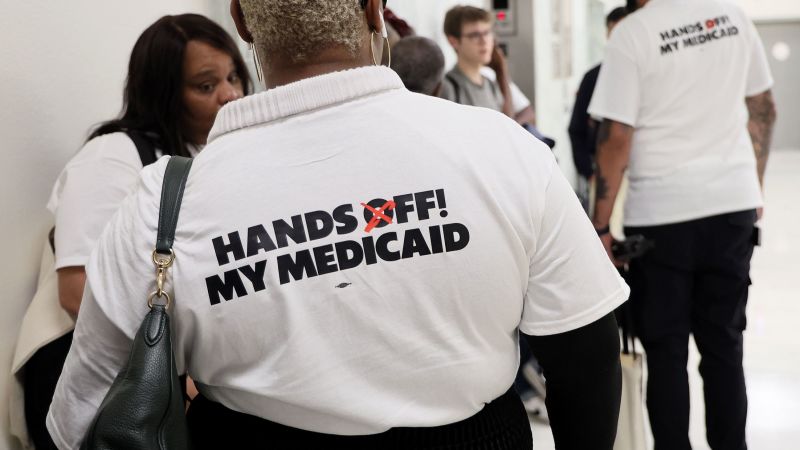Joanna Parker, a 40-year-old resident of Garner, North Carolina, faces immense pressures concerning her Medicaid coverage in the context of an evolving political landscape. She works part-time at a local home goods store, logging approximately 20 hours weekly while dealing with serious health issues, including degenerative disc disease that necessitates regular doctor visits, physical therapy, and medication. As the recent expansion of Medicaid in December 2023 allows her access to these essential medical services, Parker couldn’t help but voice her anxiety regarding potential changes to the Medicaid program, particularly the sweeping Republican tax and spending cuts package passing through Congress.
Parker’s worries are centered around a proposed work requirement for Medicaid enrollees, which could severely impact her ability to maintain her health insurance. As the bill has progressed through the legislative process, it not only embodies a shift towards requiring many enrollees to work, volunteer, or participate in job training programs but also creates an atmosphere of uncertainty for individuals like Parker who require continuous healthcare to manage chronic health conditions. Parker, who was uninsured for nearly a decade prior to the Medicaid expansion, relayed her sentiments regarding the high stakes involved: “If I lose my insurance, I lose my ability to work.” This highlights the precarious situation many individuals reliant on Medicaid may find themselves in, grappling with the intersection of health needs and employment demands.
The House GOP’s bill proposes that Medicaid recipients aged 19 to 64 fulfill a minimum of 80 hours of work or related activities each month to retain their coverage, signaling a shift toward stricter conditions associated with Medicaid enrollment. The expectation is for parents, pregnant women, and medically frail individuals to be exempt, yet the ambiguity surrounding the enforcement and reporting processes raises red flags for many. For Parker, who has unsuccessfully sought full-time employment over the last year and a half, navigating these bureaucracies adds another layer of stress to her situation. “It will be so easy to lose your coverage if you do the reporting the wrong way,” she expressed, emphasizing her fear of being ensnared in the complexities of a system that could ultimately strip her of essential health services.
Advocates for these work requirements argue that the mandate aims to transition able-bodied adults off Medicaid, encouraging them to find employment and therefore lessen government expenditure on low-income healthcare programs such as Medicaid and the Affordable Care Act. In contrast, studies indicate that requiring work does not guarantee job attainment nor does it automatically correlate with increased employment rates among Medicaid participants. The potential fallout from similar legislation in states like Arkansas shows alarming trends of disenrollment among recipients who struggled to meet administrative requirements. Reports have surfaced detailing how applicants lost coverage even after being exempted due to complications in communication and system navigation, further underscoring the hardships a rigid policy could impose.
Moreover, various findings indicate that a significant number of Medicaid enrollees do work. KFF, a nonpartisan health policy research group, noted that nearly 38% of adult Medicaid recipients had full-time employment, while an additional 20% held part-time positions. However, over 31% reported not working due to caregiving duties or health issues that would likely qualify for exemptions under the new proposal. This discrepancy highlights the precariousness inherent in navigating the supplemental layers of government assistance.
As residents such as Katrina Falkner and Dana Bango grapple with the potential ramifications of enforced work requirements, their stories serve as poignant reminders of the personal stakes involved in policy shifts that govern healthcare access. Falkner, who has faced her own struggles with administrative red tape, had to endure an exhaustive journey to reinstate her Medicaid coverage—a journey fraught with complications stemming from lost paperwork on the state’s end. Meanwhile, Bango, a cancer survivor, echoes similar fears regarding her capacity to manage the reporting responsibilities expected if the work mandate becomes law.
The implications of these political maneuvers could displace millions of Medicaid beneficiaries, thrusting them into an uncertain terrain where access to healthcare hangs precariously in the balance. An estimated 4.8 million recipients could become uninsured over the next ten years due to this mandate, signaling dire consequences for vulnerable populations already facing significant barriers to health and wellbeing. As the healthcare debate continues to unfold in Congress, the intersection of work, health access, and personal stories remains a critical consideration as policymakers face the profound impact their legislation could have on everyday lives.



